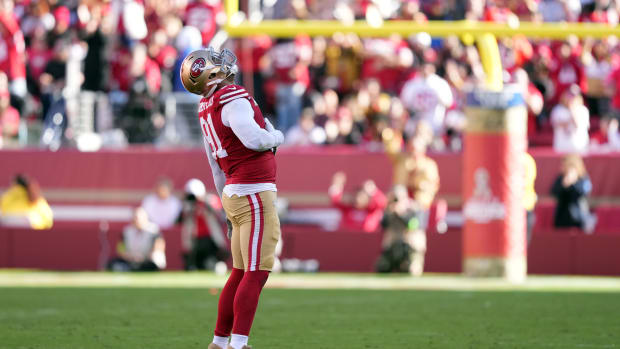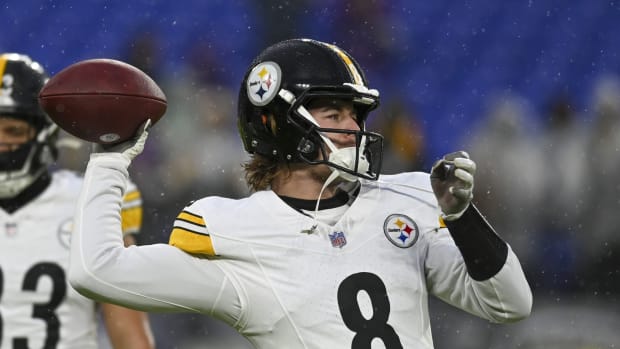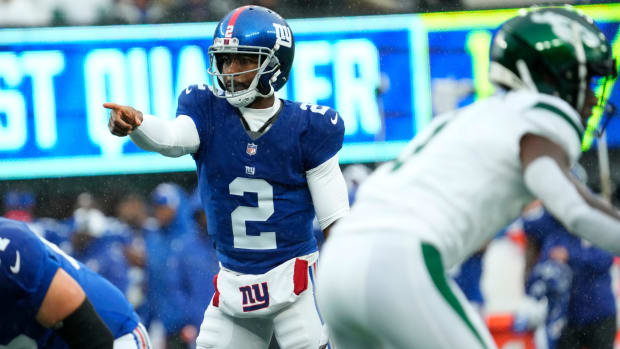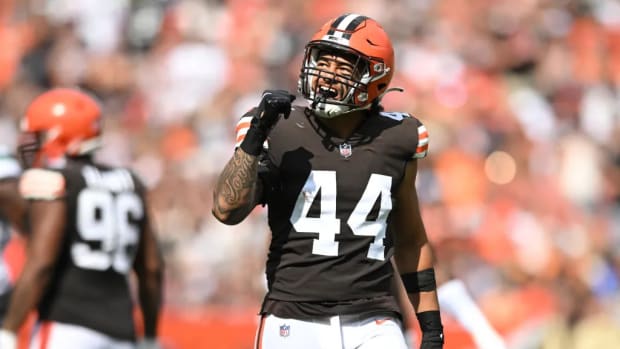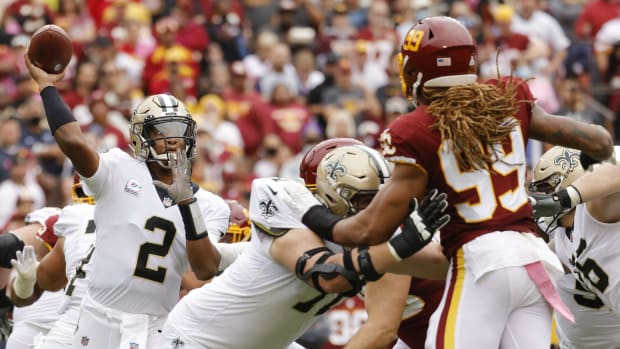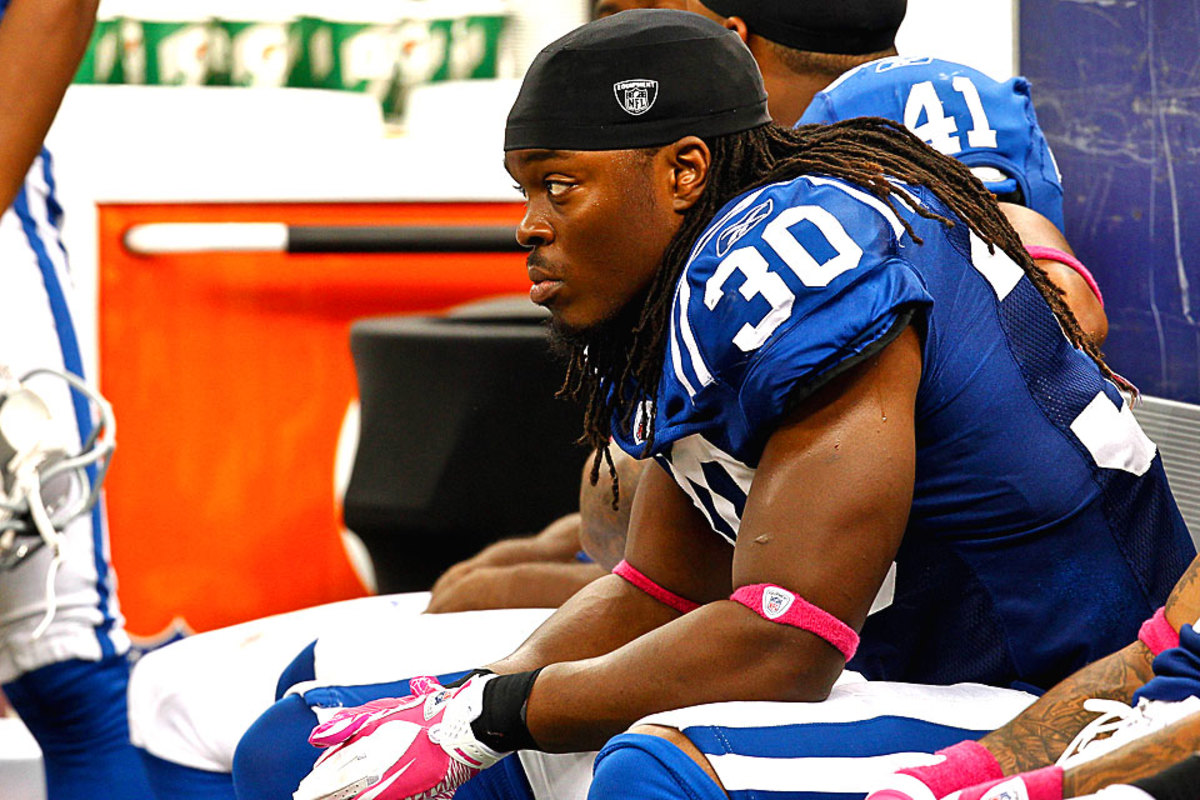
The Games Go On, And So Does Life
Even though he was an undrafted rookie who played college football at William & Mary, the smallest school in one of the smallest conferences in the country, David Caldwell wasn’t intimidated by his introduction to the NFL.
His first training camp with the Colts in 2010 felt like freshmen orientation all over again. Everything was taken care of, from where to live to what to eat. While most veteran teammates went home at noon, Caldwell and other rookies stayed after morning practice until 3 or 4 p.m., sitting in meeting after meeting after mind-numbing meeting. Every conceivable topic was covered: How to carry yourself in public … How to speak to the media ... Why it’s important to ask for a ride home when you’ve been drinking ... How to save money … How to associate with good people, register a gun, eat a nutritious breakfast ...
If there was one blessing to being undrafted, it’s that Caldwell missed the league’s rookie symposium—all draftees must attend—and didn’t have to hear the same platitudes repeated over and over again.
But at the Colts’ facility, on and on the lectures went …
A former Colt, the 26-year-old David Caldwell went through camp with the Giants this summer but didn't make the final cut. (Christopher Szagola/Cal Sport Media)
“Pretty much everything your parents would say if they had the time to sit down and tell you,” Caldwell says. “You have young guys coming in with a lot of money. And the league does a good job of making you feel comfortable. The only thing I really had to worry about was football.”
Leaving, of course, is always the hardest part.
After three seasons in Indianapolis, one as a starting safety and two nursing myriad injuries, Caldwell was back in the job market. He signed with the Giants last April and had a decent training camp. But he woke up one morning and saw several missed calls. He recognized the area code and then looked at his calendar. It was the Giants calling. It was Aug. 31. It was bad news: cut day.
He reported to work fully aware of what would happen next. The meeting with Giants brass was short and courteous. “For them it’s just another day,” Caldwell said. “It was just business.”
All of a sudden, the structure that had been thrust upon Caldwell since he became a professional football player vanished. He moved back to his childhood home in Montclair, N.J., and kept working out, though his schedule was wide-open and uncertainty defined his life.
At 26, he has a finance degree to fall back on. He wants to launch his own clothing company. He’s dabbled as a personal trainer. He also just launched a blog. “I’m not too worried right now, because I have some options,” Caldwell says. “I have a lot of options.”
But having options is different than having direction. Caldwell needs to figure out what’s best for his future and what will make him the happiest. But unlike his entrance into the NFL, there’s been no structure or guiding hand. The NFL Players Association hopes to change that with a new initiative called The Trust.
Launched last month, The Trust is an arm of the NFLPA that offers free amenities to former players in areas of health and nutrition, career transition and financial education. The $22 million a year budget (which will increase by five percent annually) was procured from the 2011 collective bargaining agreement with the league. “A big part of our negotiations had little to do with dollars or the salary cap,” says Kevin Mawae, the former NFLPA president who stepped down in 2012 . “It was about benefits and post-career options. So this was a huge victory for us.”
The NFLPA spent the last two years assembling the program. They set up partnerships with the University of North Carolina, Tulane University and the Cleveland Clinic. They hired a staff of six, including four project managers who will work directly with the players. (Two of the project managers, Hannibal Navies and Zamir Cobb, are former players.)
Any former player who was in the league for two years, no matter his status, be it a 53-man roster or a practice squad, can sign up by calling a toll-free number or sending an email. Every player will be called back by a project manager, who will serve as a point-person as the retired player makes travel arrangements, doctors appointments and arrangements to attend seminars. Everything is paid for, including airfare.
“Even airfare for spouses,” says Bahati Van Pelt, director of The Trust.
The average NFL career lasts less than four years, according to the NFLPA, and while it’s a common misconception that most players endure financial or emotional hardship after retiring, it’s true that almost all are open to receiving guidance as they transition into a new life. “Everybody has a different story, different issues, different goals and dreams beyond the game,” Mawae says. “This program is a road map for every guy to help with their future.”
Roman Oben was a third-round pick of the Giants in 1996 (left). He played 12 seasons in the NFL for four teams, including the last four with Chargers (top right). In September 2006, his alma mater, Louisville, honored his No. 72 jersey. Oben, 41, is now a broadcaster who wants to use the NFLPA’s The Trust to get a full medical workup. (Clockwise from left: Bill Kostroun/AP :: John Pyle/Cal Sport Media :: Dave Klotz/Icon SMI)
Roman Oben, for example, became a broadcaster after retiring in 2008 from a 12-year NFL career. The 41-year-old hopes to use The Trust to get a complete physical, something he might have had to pay for on his own in the past. “The levels of care you had access to when you played football,” Oben says, “it’s something that guys might take for granted.”
Matt Ulrich, another lineman who played only two NFL seasons, traded his three-point stance for a 9-5 desk job. The soon-to-be 32-year-old no longer works out 25 hours a week and has put on 15 pounds since leaving football in ’06. He no longer has a regimen to follow. “I want to use The Trust,” he says, “to know how should I be working out so I can walk when I’m 60.”
Some players might use The Trust for networking or to finish their degrees.
“I’m married, have two teenagers and have my Master’s degree,” says Mawae, an All-Pro center who left behind a 16-year career after the 2009 season. “My needs might be completely different than [players] who came out of college after three years without a degree. But the beauty of this program is we can all get something out of it.”
But can The Trust reasonably accommodate everyone who wants to sign up for it? Is it staffed and funded well enough to handle the legions of retired players? Van Pelt says the program will grow in lockstep with enrollment, but it remains to be seen how much it will be used and how much it can truly offer.
Assuming, that is, players aren’t too proud to seek help.
“I’m sure you’re going to have wives calling the 1-800 number, not the players,” Oben says. “But in the end, people should realize: We used to complain there were not resources to facilitate certain things. Now they’re being offered to us, and you’d be stupid not to take advantage.”
Football players have always been faced with two harsh realities when they reach the end of the line. The games go on, and so does life. The difference now is they have someone helping them find their way.



































